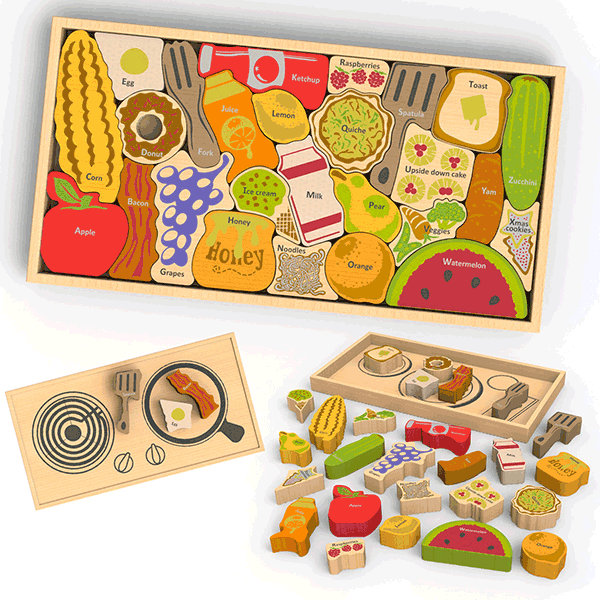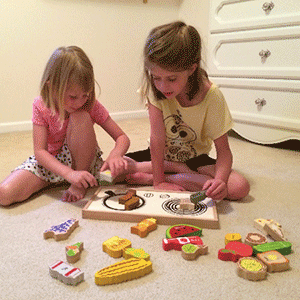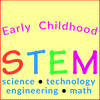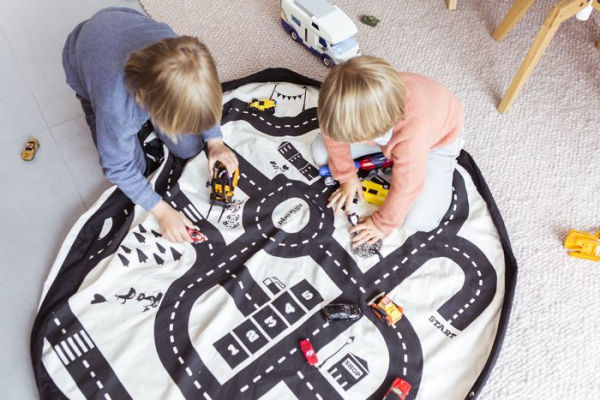

Wooden Food Puzzle and Serving Tray
Details
Chefs are pretty cleaver, you know. This alphabet food puzzle functions as a grocery play set for budding chefs. It fits together as a wooden alphabet puzzle. Children learn the names of foods while they role-play cooking activities. Later, they learn the accompanying alphabet letters and beginning sounds. An award-winner, it is cut in a traditional jigsaw fashion.
The pieces display upper-case alphabet letters on one side and lower-case alphabet letters on the other. Almost an inch thick, the pieces make handling and manipulating easy-breezy for little hands. The beech wood tray is printed to function as a serving tray, or it flips over to become a pretend stovetop. This combo food puzzle and play set is a NAPPA Silver Award Winner.
ECO-FRIENDLY TOY
SIZE: 16.25” x 8.5” x 1”
AGE RANGE: 3-6 years
AWARDS: NAPPA Silver Award Winner



Developmental Value
Early reading skills begin with recognizing alphabet letters. To build this puzzle, children naturally improve their knowledge of both upper-case and lower-case letters.
Puzzles are a problem-solving activity developing cross-brain thinking skills. Effective problem solving requires a controlled mixture of both logic (left-brain activity) and creative (right-brain activity) thinking. Good problem solvers switch from one set of skills to the other. This is not always easy but becomes easier with problem-solving practice.
-
Logic (analytic) thinking is developed through ordering the pieces, comparing them, contrasting them, evaluating them and selecting the correct piece. The child must select the best alternative from the options available by narrowing down the range of possibilities (a convergent process).
-
Creative thinking is developed when a piece doesn't fit because the child must consider a broader set of solving options such as manipulating the piece, flipping the piece, considering the alphabet order, or solving surrounding pieces.
Through spatial awareness of the pieces, puzzle play lays the groundwork for early math skills.
Puzzles are a great tool for building attention span in children because they require concentration for completion. The key is finding the sweet spot of difficulty. Too easy requires little concentration, too hard and the frustration creates work, not play.
The large chunky puzzle parts support fine motor skills when children clutch and manipulate the pieces.
As a kitchen play set, the foods, equipment, and utensils become parts of dramatic play, imagination, and storytelling. Pretend play is a natural way for children to safely break through a reality barrier in a world that can feel vulnerable. They learn about themselves and the world, their likes, and dislikes their interests and abilities. Through pretend play, children learn to negotiate, delay gratification, assign tasks and rolls, consider the perspectives of others and transfer knowledge from one situation to another. It is also practice to interact with other children, read their social clues, negotiate and take turns, and recognize and control their own emotions.
Because there is a carrying tray, this puzzle can be used as a travel toy for activities away from home. For homes who focus on Montessori shelving with work options, this puzzle sits orderly in its box.
Manufacturer
Located in Fort Collins, Colorado, BeginAgain belives in hands-on experiential toys, devoid of batteries. BeginAgain also has a strong commitment to eco-friendly products. Their entire line of products is made from plant-based materials.
This durable wooden puzzle is handcrafted from sustainable plantation-grown trees. BeginAgain chooses to use rubberwood (hevea brasiliensis) because it grows quickly. As it is a strong, sustainably grown hardwood, it is an excellent material for making heirloom quality toys.
The puzzle was designed in Fort Collins, Colorado. Manufacturing in China, near the native source of the wood, allows for smarter, more efficient use of energy, reducing the shipping footprint. The puzzles are packaged back in the USA, ensuring quality control. The manufacturing partner is female owned, and family run. The factory believes in the principles of fair living wages and sustainable practices. Independent audits ensure fair working conditions, product safety, and quality control standards.

